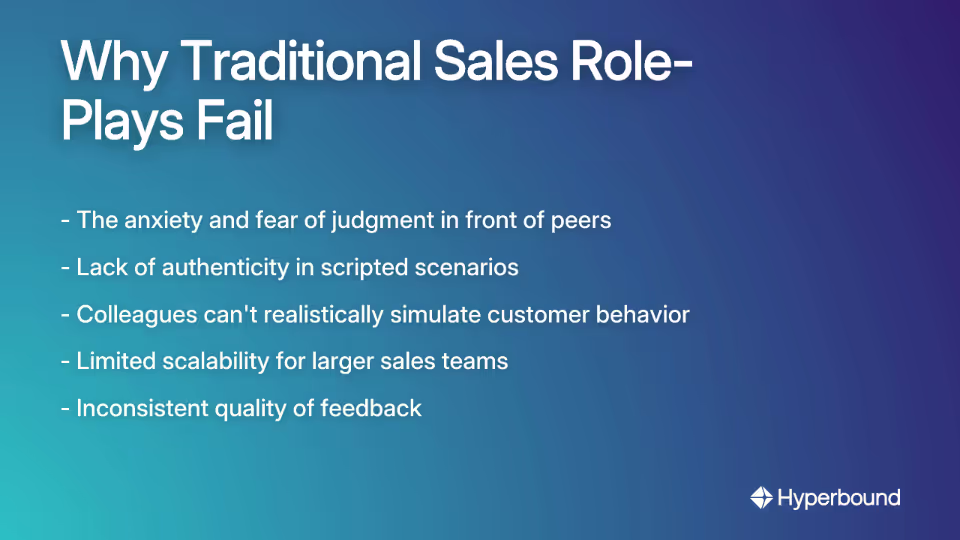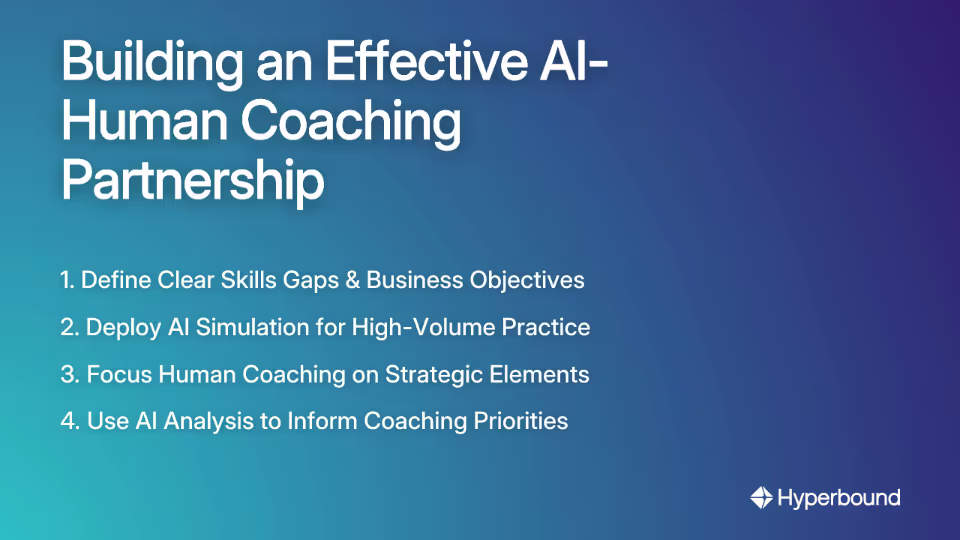
You've been there. Your sales manager's voice echoes across the room: "Let's do some role-playing!" Instantly, your stomach tightens. The room falls silent as everyone avoids eye contact, hoping not to be chosen first. When your turn inevitably comes, you stumble through a stilted conversation with your colleague awkwardly pretending to be a prospect, while the rest of the team watches and judges.
"I have not seen an effective role play session in my entire career," confessed one sales professional on Reddit, expressing a sentiment that resonates with countless others.
But what if there was a better way? Enter AI-powered sales simulation - a technology promising to revolutionize how sales teams practice their craft. As AI continues advancing across industries, could it finally solve one of sales training's most persistent and uncomfortable challenges?
The Anatomy of a Failed Role-Play Session
Traditional sales role-playing has persisted for decades despite its well-known flaws. Understanding why these sessions often fail helps clarify what an effective alternative needs to address.

The Awkwardness & Anxiety Factor
For many sales professionals, especially those early in their careers or those with natural social anxiety, role-playing in front of peers and managers triggers genuine distress.
"I'm probably one of the most awkward people I know. I've got diagnosed social anxiety," shared one salesperson. "I start overthinking everything and my numbers tank."
This anxiety creates a counterproductive training environment. Instead of focusing on improving their sales techniques, reps become preoccupied with avoiding embarrassment. The fear of judgment inhibits experimentation and authentic practice - exactly the opposite of what effective training should encourage.
The Realism Gap
Another fundamental issue is the lack of authenticity in scripted scenarios. As one sales professional pointed out, "You can't recreate a live customer meeting because there's so many factors that go into how a conversation goes."
When colleagues play customer personas, they often:
- Follow predictable scripts
- Lack the spontaneity of real prospects
- Miss the emotional nuances of genuine objections
- Fail to create truly challenging scenarios
"The problem with role play is that most people are following a set script with someone anticipating what the player is going to say," noted another sales rep. Without realistic pushback and unexpected turns, the exercise loses its value in building true sales muscle memory.
The Scalability Problem
Beyond the psychological and realism barriers, traditional role-playing faces logistical challenges:
- Managers can only conduct so many one-on-one feedback sessions
- Top performers receive disproportionate coaching time
- Feedback quality varies widely based on manager availability and skill
- Consistent practice is nearly impossible to maintain across large teams
Industry research has found that top-performing sales reps receive four times more coaching than average reps, yet monthly coaching sessions per rep have decreased due to manager overload. This creates a widening gap between high and low performers that's difficult to address with traditional methods.
The Rise of AI Sales Simulation: A Judgment-Free Dojo
AI-powered sales role-play tools offer a compelling alternative to these longstanding challenges. Think of them as flight simulators for sales professionals - providing a safe environment to practice critical skills before the stakes get real.
A Safe, Private Practice Environment
Perhaps the most immediate benefit of AI simulation is eliminating the social pressure that makes traditional role-play so uncomfortable.
"What if you could practice your pitch, handle objections, and receive detailed feedback without a single person watching or judging you?" asks sales trainer and consultant John Barrows. AI creates precisely this environment - a judgment-free zone where reps can experiment, fail, and improve without anxiety.
For sales professionals with social anxiety or those still building confidence, this safe space for trial and error can be transformative. The technology removes the performance anxiety that prevents effective learning, letting reps focus entirely on refining their approach.
Unlimited, On-Demand "At-Bats"
While some argue "you need at bats with people" for effective sales practice, the reality is that human-led role-playing sessions are severely limited in frequency.
AI simulation changes this equation dramatically:
- Practice anytime, anywhere without scheduling constraints
- Run through the same scenario multiple times to perfect your approach
- Test different tactics against the same objection to compare effectiveness
- Focus on specific challenging moments in the sales process
According to industry data, reps using AI role-play tools typically practice 4-6 times before submitting a final version for review - a frequency impossible to achieve with manager-led sessions. This volume of practice accelerates skill development and builds the muscle memory essential for natural, confident selling conversations.
Objective, Consistent Feedback
Human feedback inevitably varies based on who's providing it. AI offers something different: consistent, data-driven analysis that identifies specific areas for improvement.
Modern AI sales simulators can analyze:
- Talk-to-listen ratios
- Speech patterns and filler words
- Question quality and frequency
- Objection handling techniques
- Adherence to specific methodologies or talk tracks
Platforms like Hyperbound take this further with AI-Powered Scorecards that track key selling moments and provide instant, objective feedback. This data-driven approach helps reps identify specific improvement areas rather than receiving vague feedback like "be more confident" or "sound more natural."
Measurable Business Impact: Beyond Comfort to ROI
For sales leaders, the benefits of AI simulation extend beyond making role-play less awkward - they translate directly to business results.
Accelerated Ramp Time
Traditional onboarding for sales reps can take as long as 26 weeks, according to industry research. During this period, new hires generate little to no revenue while consuming substantial resources.
AI role-play provides a structured environment for new reps to practice essential conversations hundreds of times before facing real prospects. This accelerated skill development can dramatically reduce ramp time, turning new hires into productive team members faster.
Scalable, Consistent Coaching
As sales teams grow, maintaining coaching quality becomes increasingly difficult. AI simulation offers a scalability breakthrough, ensuring every rep - regardless of location, tenure, or manager bandwidth - receives consistent practice opportunities and feedback.
Case in point: Cisco saved an estimated 38 weeks of management time by using AI to automate role-play reviews for 3,500 sellers. This freed up managers to focus on more strategic coaching rather than basic skill drilling.
Improved Sales Metrics
The ultimate test of any training approach is its impact on revenue. Organizations implementing AI-powered practice have reported significant improvements in key metrics:
- Higher connection rates on cold calls
- More meetings scheduled per rep
- Increased average deal sizes
- Higher conversion rates at key pipeline stages
By providing more practice opportunities with immediate feedback, AI simulation helps reps internalize effective selling behaviors that directly influence these metrics.

The Human Element: Where AI Still Falls Short
Despite its impressive capabilities, AI sales simulation isn't without limitations. Understanding these constraints is essential for implementing effective training programs.
The Empathy & Relationship Gap
"Sales is still a combination of science and art," one sales professional reminds us. "I still have yet to see [AI] build a relationship."
This observation highlights a fundamental limitation. While AI can simulate conversations, it cannot fully replicate the human connection at the heart of complex sales. The emotional intelligence required to read subtle cues, build trust, and navigate relationship dynamics remains distinctly human.
The "Knowingness vs. Doingness" Dilemma
As another sales veteran insightfully noted, "AI can help with the knowingness of something, they can't however help with the doingness." This distinction is crucial.
AI excels at helping reps master the "knowingness" - the talk tracks, product knowledge, and objection responses. But the "doingness" - applying this knowledge fluidly in unpredictable human interactions - requires a different kind of practice.
For example, an AI simulator can teach you how to handle a specific objection, but it can't fully prepare you for the emotional experience of a high-stakes negotiation with a CFO who suddenly questions your entire value proposition.
The Risk of Robotic Reps
There's also legitimate concern that over-reliance on AI training could produce reps who sound scripted or robotic themselves. "AI needs to get less robotic before it truly helps here," observed one skeptical sales professional.
Without balanced training that includes human coaching on adaptability and authentic connection, reps might become too dependent on memorized scripts rather than developing the creativity and emotional intelligence that distinguishes exceptional salespeople.
The Hybrid Future: AI for Practice, Humans for Strategic Coaching
The most effective approach isn't choosing between AI and human coaching - it's leveraging both in a strategic partnership. Here's how organizations are implementing this hybrid model:

- Define Clear Goals: Start by identifying specific skill gaps or business objectives (improving discovery calls, reducing objection-related deal losses, etc.)
- Implement Targeted AI Practice: Deploy AI simulation for high-volume repetitive practice on core skills and common scenarios. Platforms like Hyperbound allow teams to create customized roleplays for every stage of the sales cycle, from cold calls to renewal conversations.
- Layer in Human Coaching: Have managers focus on strategic coaching - helping reps apply skills to specific deals, navigate complex relationship dynamics, and develop the emotional intelligence AI cannot teach.
- Use AI to Inform Human Coaching: Advanced platforms like Hyperbound's AI Real Call Scoring analyze actual customer conversations to identify patterns and coaching opportunities, making human coaching more targeted and effective.
This hybrid approach addresses the limitations of both traditional role-playing and AI-only training. It eliminates the awkwardness and scalability issues of peer-to-peer practice while preserving the irreplaceable human guidance needed for relationship-driven sales.
Conclusion: Killing Awkwardness, Not Human Connection
So, can AI finally kill awkward sales role-play sessions? The answer is a qualified yes - it can eliminate the uncomfortable, inefficient aspects of traditional role-play while preserving the essential skill development.
The most forward-thinking sales organizations are already embracing this future. They're using AI to provide their teams with unlimited, judgment-free practice opportunities while focusing human coaching on the nuanced, relationship-driven aspects of selling that technology cannot replicate.
The result isn't robotic salespeople but more confident, prepared professionals who have developed core skills through extensive practice before facing real customers. They bring both technical proficiency and authentic human connection to every conversation.
As one sales enablement leader put it: "We don't use AI to replace our managers. We use it to make every minute they spend coaching exponentially more valuable."
By embracing this balanced approach, sales organizations can finally bid farewell to those awkward role-playing sessions without sacrificing the quality and effectiveness of their training. The future of sales readiness isn't choosing between humans and AI - it's using each for what they do best.
Frequently Asked Questions
What is AI sales simulation?
AI sales simulation is a technology that uses artificial intelligence to create realistic, interactive role-playing scenarios for sales professionals. It provides a private, judgment-free platform where reps can practice conversations, handle objections, and refine their pitch without the pressure of being watched by peers or managers, much like a flight simulator for pilots.
Why is traditional sales role-playing often ineffective?
Traditional sales role-playing is often ineffective due to several key factors: it creates high levels of anxiety and fear of judgment, the scenarios lack the authenticity and unpredictability of real customer interactions, and it's difficult to scale for large teams, which results in inconsistent practice and feedback.
How does AI sales simulation improve upon traditional role-play?
AI sales simulation directly solves the main problems of traditional role-play by offering a private, anxiety-free practice environment. It allows for unlimited, on-demand practice with realistic AI personas and provides consistent, objective, data-driven feedback that helps sales reps pinpoint specific areas for improvement—a level of scale and consistency that manager-led sessions cannot achieve.
Can AI completely replace human sales coaches?
No, AI is not meant to replace human sales coaches. AI excels at providing scalable practice and data analysis on foundational skills (the "knowingness"). However, it cannot replicate the empathy, strategic insight, and complex relationship-building guidance (the "doingness") that an experienced human coach provides. The most effective strategy is a hybrid model that uses AI for practice and data, allowing human coaches to focus on high-level, strategic development.
What are the main business benefits of using AI for sales training?
The primary business benefits of using AI for sales training include a significantly faster ramp time for new hires, the ability to deliver scalable and consistent coaching across an entire sales organization, and measurable improvements in key sales metrics. Teams using AI simulation often report higher connection rates, more meetings booked, and increased deal conversion rates.
Will using AI make my sales reps sound robotic?
This is a common concern, but the goal of AI simulation is to make reps sound more natural and confident, not robotic. By providing a safe space for extensive practice, reps can internalize key talking points and objection-handling techniques until they become second nature. This frees them up to focus on the human connection in a real conversation. The key is to blend AI practice with human coaching that emphasizes adaptability and authentic communication.
Book a demo with Hyperbound
.png)













